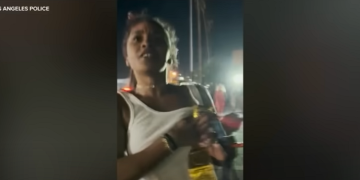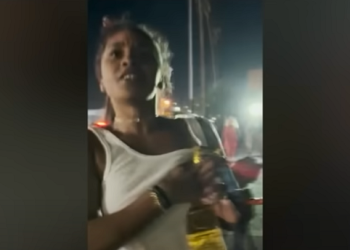The FBI confirmed today that North Korea was behind the crippling cyberattack that prompted Sony Pictures Entertainment to cancel the release of “The Interview,” and President Barack Obama said the nation would respond in kind.
“They caused a lot of damage, and we will respond,” Obama said. “We will respond proportionally and we’ll respond in a place and time and manner that we choose.”
Obama declined to provide specifics, but said he thinks Sony erred by canceling the release of “The Interview,” a Seth Rogen-James Franco dark comedy centered on a fictional assassination of North Korean dictator Kim Jong- un.
“Sony is a corporation. It suffered significant damage,” Obama said. “There were threats against its employees. I am sympathetic to the concerns that they faced. Having said all that, yes, I think they made a mistake.
“… We cannot have a society in which some dictator someplace can start imposing censorship here in the United States,” he said. “Because if somebody is able to intimidate folks out of releasing a satirical movie, imagine what they start doing when they see a documentary that they don’t like, or news reports that they don’t like. Or even worse, imagine if producers and distributors and others start engaging in self-censorship because they don’t want to offend the sensibilities of somebody whose sensibilities probably need to be offended.
“That’s not who we are. That’s not what America’s about.”
He added, “I wish they (Sony) had spoken to me first.”
But Sony CEO Michael Lynton told CNN following the president’s remarks that the studio acted appropriately.
“In this instance, the president, the press and the public are mistaken on what actually happened,” Lynton told CNN. “We do not own movie theaters. We cannot determine whether or not a movie will be played in movie theaters.
“We experienced the worst cyberattack in American history and persevered for three and a half weeks under enormous stress and enormous difficulty, all with the effort of trying to keep our business up and running and get this movie out to the public,” he said.
But Lynton said once theater owners said they would not show the movie, the studio was left with little choice.
“We have not caved, we have not given in,” he told CNN. “We have persevered, and we have not backed down. We have always had every desire to have the American public see this movie.”
Sony Pictures Entertainment later released a statement reiterating that the company had no choice but to cancel the film’s Christmas release, given theater owners’ refusal to show it. But the company insisted it is still committed to making the movie available.
“Let us be clear, the only decision that we have made with respect to the film was not to release it on Christmas Day in theaters, after the theater owners declined to show it,” according to the company. “Without theaters, we could not release it in the theaters on Christmas Day. We had no choice.
“After that decision, we immediately began actively surveying alternatives to enable us to release the movie on a different platform. It is still our hope that anyone who wants to see this movie will get the opportunity to do so.”
Theater owners began dropping plans to show the film after the group taking credit for the hacking, known as Guardians of Peace, posted a threat online that theaters showing “The Interview” would be subject to violence. The group punctuated the threat with, “Remember the 11th of September 2001.”
Earlier today, the FBI said it “now has enough information to conclude that the North Korean government is responsible for these actions.”
Obama said there is no indication that North Korea acted in conjunction with any other country — eliminating speculation about possible involvement by China.
The FBI said it found telltale signs in the cyberattack.
“The FBI has determined that the intrusion into (Sony Pictures Entertainment’s) network consisted of the deployment of destructive malware and the theft of proprietary information, as well as employees’ personally identifiable information and confidential communications …” according to the FBI.
“Technical analysis of the data deletion malware used in this attack revealed links to other malware that the FBI knows North Korean actors previously developed.”
Before the statement was issued, actor George Clooney said he and his agent circulated a petition in support of Sony after it became the victim of a the cyberattack and before it cancelled the release of “The Interview,” but none of the many entertainment figures who were asked to sign it agreed to do so.
Speaking to Deadline Hollywood in an interview published online, Clooney said the way his petition was received shows how scared the industry has become.
“This is just where we are right now, how scared this industry has been made,” Clooney said in a ‘Deadline Hollywood interview published online. “Quite honestly, this would happen in any industry.”
As have other celebrities, Clooney said the news media focused inordinately on the embarrassing emails the hackers uncovered, including from Sony Pictures Entertainment co-chair Amy Pascal, instead of the threats to American freedoms.
“A good portion of the press abdicated its real duty. They played the fiddle while Rome burned. There was a real story going on. With just a little bit of work, you could have found out that it wasn’t just probably North Korea; it was North Korea,” he said.
Chris Dodd, chairman and CEO of the Motion Picture Association of America, said the hacking scandal went way beyond the fate of the film “The Interview.”
“This situation is larger than a movie’s release or the contents of someone’s private emails,” Dodd said. “This is about the fact that criminals were able to hack in and steal what has now been identified as many times the volume of all the printed material in the Library of Congress and threaten the livelihood of thousands of Americans who work in the film and television industry, as well as the millions who simply choose to go to the movies.”
Rep. Adam Schiff, D-Burbank, a senior member of the House Intelligence Committee, said: “The North Korean government’s outrageous act of cyberterrorism against Sony demands a forceful response and I hope that President Obama will ensure that Kim Jong-un and his regime are held to account for an act of economic and political aggression against the United States.”
Addressing the entertainment industry, Schiff said he was “deeply concerned by the precedent of this cyberattack preventing the distribution of a film and hope that it can be widely disseminated in the near future — this would be the most powerful repudiation of North Korea’s belligerent cyberattack.”
Meanwhile, the hacking group that has identified itself as Guardians of Peace apparently sent an email to top Sony executives threatening that it would release more private data if “The Interview” is ever leaked or released in any way.
“We will ensure the security of your data unless you make additional trouble,” the email read, according to CNN. “Now we want you never let the movie released, distributed or leaked in any form of, for instance, DVD or piracy.”
The email went on to say, “And we want everything related to the movie, including its trailers, as well as its full version down from any website hosting them immediately,” CNN reported.




















